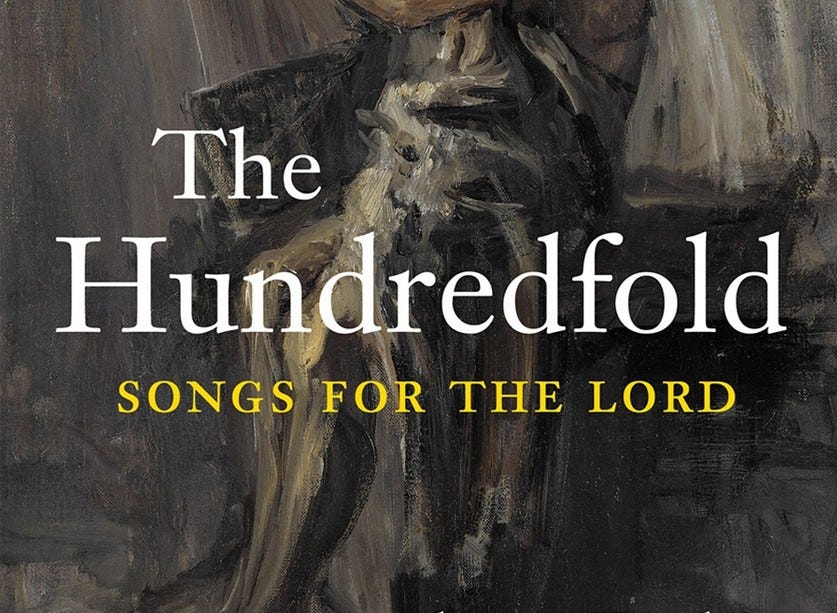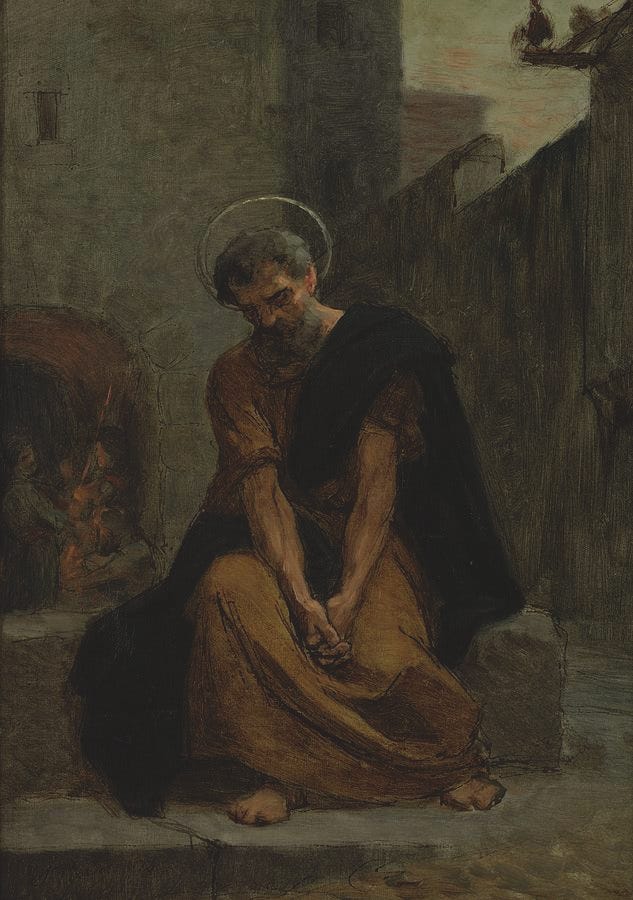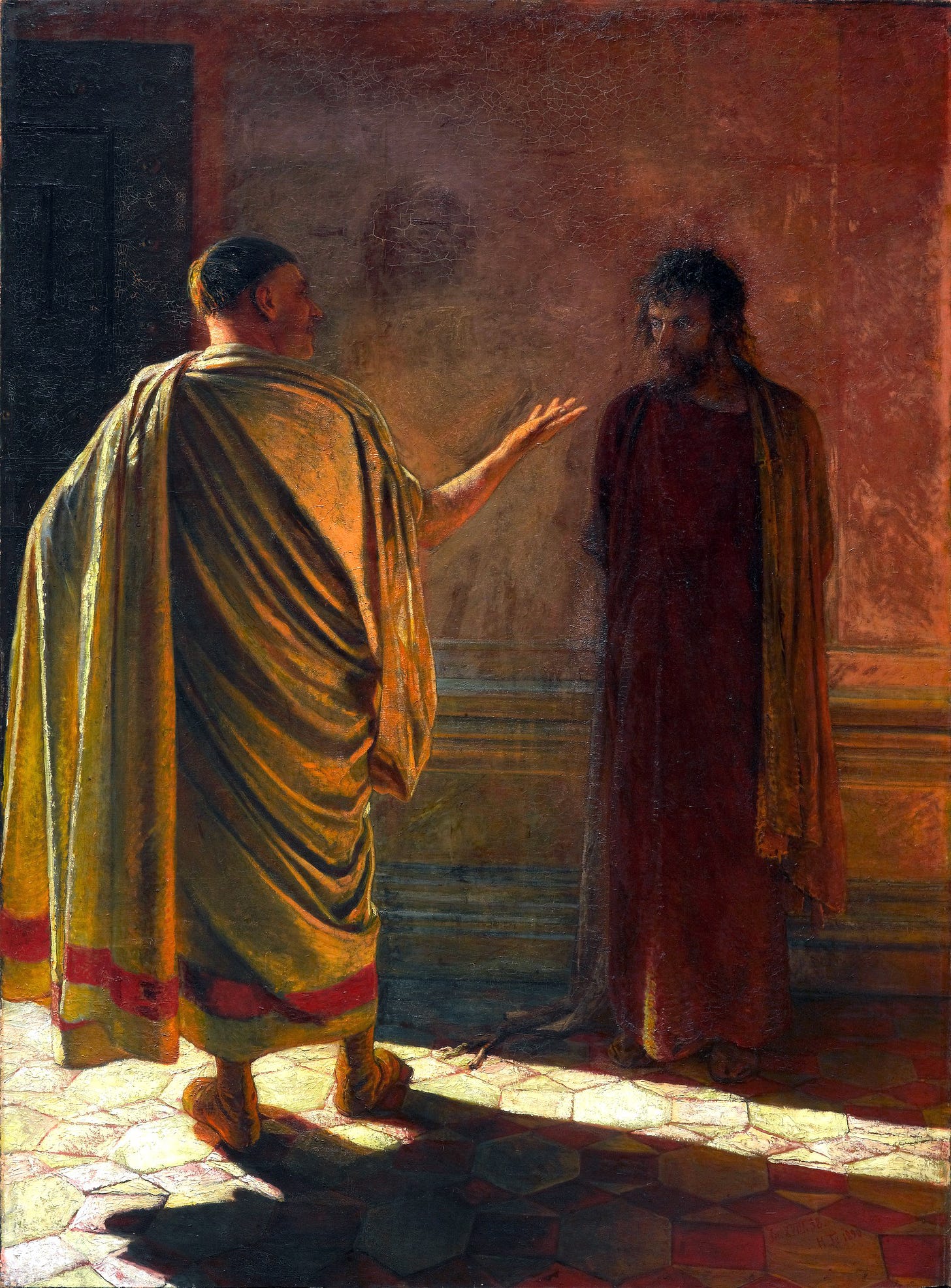In my post on the excellent Old English poem, The Wanderer1, I talked about how it is no easy task to get people interested in reading ancient esoteric poetry. That post surprised me and became one of my most popular. Today’s post is about a work that is more than a millennium newer, published in 2019.
This last week I have been reading Anthony Esolen’s The Hundredfold: Songs for the Lord. It is an excellent work, and definitely the best poetry I have read from a living author. It is a masterpiece of communicating the True, Good, and Beautiful.
The introduction alone merits the book’s purchase. In it, besides introducing the one hundred poems the book contains, Esolen gives an informative and lucid apology for poetry in its true, human definition: songs, “which have to do with form, variation, subordination, coherence, luminosity, and the capacity to arouse wonder.” He defends it from what has become the standard in our universities’ English departments: free-verse, which is usually irreligious—without religio, Latin: obligation, reverence.
“The most exalted themes for the music of man have always been religious, in a broad sense. This is true of Homer and Aeschylus, Shakespeare and Milton, Dante and Petrarch…
But the exponents of free verse have largely severed themselves from the tradition of religious hymnody. They do not think of the psalms. Their conceptual audience is not the congregation… They do not sing, and they do not pray.”2
The Structure
The Hundredfold is split up into narrative poems, lyric poems, and hymns.
The overall structure of the narrative poems is shaped like the life of Christ, and the other characters in the story, as presented to us in the Gospels and Acts. The first poem begins with Mary, as the Gospel of Luke does, and some of the later hymns map onto the Resurrection, Pentecost, the Ascension, etc. These poems are not titled this way; Esolen trusts his readers to mine the riches here themselves. That is one of the joys of reading poetry, so I will keep my review brief to avoid taking that joy from my readers when they read The Hundredfold for themselves. There is incredible thoughtfulness given to the form of the individual poems and to the overall collection.
The first narrative poem is about Mary's thoughts as she watches her Son, a young man at this time, start to wake up from the sleep of night, wondering if she should pull up the blanket that is slipping off of His shoulder. There is another where St. Paul, after his conversion, writes a letter to his old Pharisee teacher Gamaliel. Another has Pilate writing a letter to Emperor Claudius, following the events of Holy Week. Another is St. Peter’s inner dialog following his denial of the Lord. These narrative poems are creative, reverent, and written in excellent iambic pentameter.
The hymns in the Hundredfold belong in hymnals. There are many prayers to the Holy Spirit that I found incredible. The hymns are found in between sections of narrative poetry and lyric poems, providing a moment of reprieve from reading and listening, and inviting the reader into speaking and singing to God. I found this very unique for a book of poetry: I was stirred to wonder and awe at some reality expressed in one of the poems, and then, on turning the page, I was given words to express that wonder in praise.
In the trackless night, O Savior Be Thyself our break of day.
The lyric poems are sometimes rhyming, sometimes not. They are meditations on lines from Scripture and are aflame with devotion. They start with an italicized line from Scripture and then contain a handful of lines of verse reflecting on it. They are beautiful, powerful meditations. These are my favorite sorts of poems. This is the sort of poetry that I find myself desiring and attempting to write: Selecting a line from Scripture, exhibiting that as the headwaters, and drawing out from those rich waters a river of verse.
Some of those lyric poems do not always go in the direction that you expect them to go, based on the Scripture exhibited. That is not to say that they mishandle the verse, but it is to say that the meditations are not cliche.
Scripture Context and Typology
There are two ways someone might take a verse out of context. One way degrades the verse; the other exalts it. The first way takes the verse and twists it to fit an alien interpretation that is foreign to authorial intent, tradition, and the theological big picture. That would be to treat the Scripture as less than it is: the true words of God, given by men as they were led along by the Holy Spirit.
But the second way exalts the Scripture and is in harmony with authorial intent, the larger witness of tradition, and the Greatest Commandment: to love God. This way takes the verse, and interprets it in a typological or poetic way, while not denying its literal meaning. So I can say, paraphrasing Esolen in one of his lyric poems, “Moses slept in a basket floating on the choppy waters; forerunner of the Saviour who slept in the boat in a violent storm,” interpreting that scene from Exodus typologically and poetically, without denying that Moses literally did get put in a basket.
Taking a verse “out of context” in this second way is actually an act of faith. It is believing, not only in the plenary inspiration of Sacred Scripture, but it is believing in Sovereignty. It believes, not only that the Holy Spirit is the true Author of a certain passage, but that He is the Author of the entire story we inhabit. It does not deny the need for proper exposition and understanding of authorial intent, but it sees another layer that is also from the Spirit of God. It confesses a belief in Beauty: it confesses that all beauty comes from God and that literary beauty is a reflection of the literary beauty that the Author of salvation has written. It is not truly taking the verse “out of context” in a sort of exegetical malpractice; it is rather a literary and devotional observation, in harmony with the Word of God Himself, who told them stories, and who came to cosmically fulfill the Law and the Prophets.
If we read about the young David, and see him pick up five smooth stones on his way to Goliath, and if we draw for ourselves a poetic connection to the Five Wounds of our Lord, by which Death and Hell have been defeated, we have, in a sense, taken Samuel out of context. There is no indication that the author of Samuel had any intention of messianic prophecy with those little rocks. Yet, in my opinion, to see a poetic and devotional connection there is a crowning of the Scripture, not an abasement of it. Many of the verse poems in the Hundredfold crown these short excerpts from the Scriptures in such a way.
The Eyes of Christ, Humanity, and Dante
There are certain themes that run throughout the poems. One of these is the Eyes of Christ. You see various characters in the narrative poems speak about them. The speaker in the hymns, who is the Church Militant, longs to look into them. The first poem ends with His eyes opening as He wakes up. Blind Bartimaeus remembers the eyes as the first thing his restored eyes saw. Pilate can only say in his recollection to Claudius, “The eyes! The eyes!”, distraught over the eyes of Christ, that pierced him like lances, as his own words echoed in the palace, unanswered: what is truth?
There is a beautiful celebration of Christ’s humanity in the Hundredfold. The whole book could be considered a commentary in verse on the line from the Nicene Creed: Et homo factus est: And He became man… One of my favorite scenes is found in the narrative poem The Boy Who Brought Some Food, which imagines the young boy from the loaves and fish miracle recounting the story to his grandchildren as an old man.
When that young boy was little, he wanted to grow up so badly: he wanted to live an adult life, and not be stuck at home, having to play with his little brothers and such. He begins to sneak off to go hear Jesus preach occasionally. One day, he hears Jesus preaching, “Unless you become like a little child, you cannot enter the kingdom of heaven.”
Simple and plain as it was, as if he were Describing the dimensions of a door And one too small for me to wriggle through Then I felt clumsy, all big feet, big head, Out among big and stupid things, like giants.
He has been longing, longing to grow up, and now he realizes his desires are misplaced. Childhood is not a curse.
He continues to follow him, and the loaves and fish miracle happens. He recounts to his grandchildren, Aaron and Simon, how
…It was the one good thing I did in life. Loving my wife that was to be, and loving Our seven children, and the youngest boy Your father, and you children like two lambs …It was all there that one day on the hill. …but keep in mind, he was a boy like you: Then be boys just as he was.
This is a glorious celebration of our humanity, now exalted because Christ has added humanity to His divinity.
There is also a nod to Dante, whose Divine Comedy Esolen has translated, in the last lines of the Hundredfold. It ends the same way Paradiso ends, with the Beatific Vision, and the will of man, being moved, being drawn in, and being perfected by the Love that turns the stars and the other planets.
Lord, grant us that “the sight of Your Face being unveiled I may have the happiness of seeing Your glory. Amen.”3
You can find The Hundredfold from Ignatius Press here.
I have recommended
and ’s newsletter, Word and Song for a long time. Go check it out if you haven’t. Here is a post on The Hundredfold from the author:
More poetry from Power & Glory here.
The Hundredfold, Introduction. Unless otherwise noted, poetic quotations are from The Hundredfold.
From Aquinas’ hymn, Adoro Te Devote







